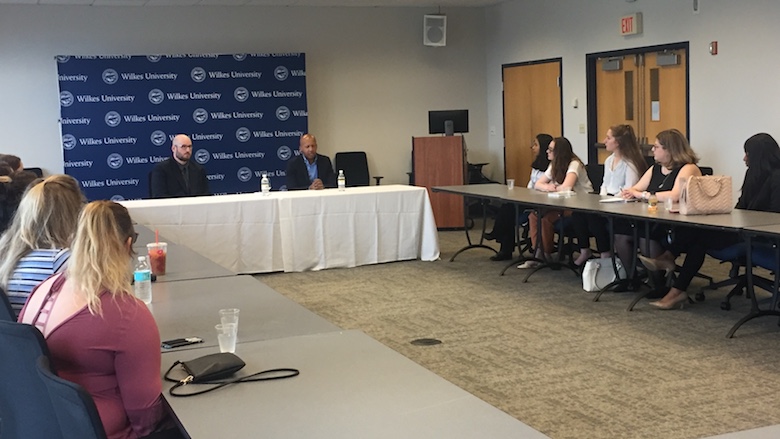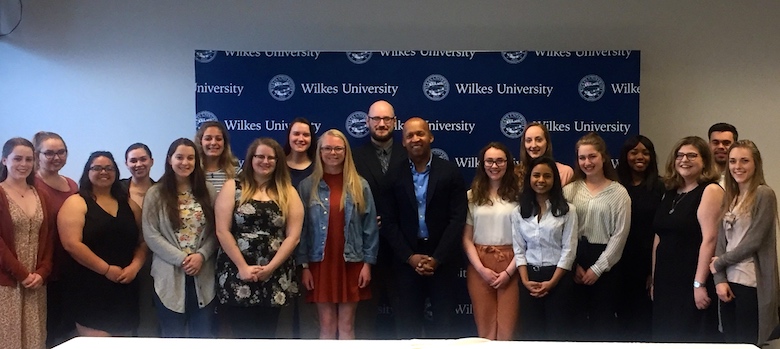EDITOR’S NOTE: News@Wilkes is revisiting this story about Bryan Stevenson, who delivered the 2019 Max Rosenn Lecture in Law and Humanities. Stevenson, the founder of the Equal Justice initiative, shared a powerful and important message about the narrative around race in the United States and about the need for criminal justice reform with the University community. “Just Mercy,” the film of Stevenson’s memoir of the same name, is available for free at this time on several streaming services.
Bryan Stevenson, attorney, human rights activist and executive director of the Equal Justice Initiative, remembers a church trip to Disney World when he was 10. The group he was traveling with stopped at a hotel in South Carolina that offered a chance to swim in a fabulous swimming pool – a treat often denied to African American children in the south, where pools remained segregated.
After he and his sister jumped into the pool, feeling the glorious coolness of water on a hot day, Stevenson says he surfaced to see a chaotic scene. All around them, white mothers were frantically getting their children out of the pool. The exodus continued until just one small white boy was left in the pool with Stevenson and his sister. As the white boy’s father removed him from the pool, Stevenson asked him what was wrong.
“You’re what’s wrong,” the father told him, adding a racially charged word to describe Stevenson.

Stevenson, at Wilkes on April 14, 2020, to deliver the annual Max Rosenn Lecture in Law and Humanities, shared the story during a question-and-answer session with Wilkes students that preceded the lecture. He used it to illustrate the fact that, in the narrative about race in America, African Americans internalize such experiences while white Americans like the man at the pool, are less likely to remember them. The story illustrated an important concern that Stevenson voiced as he opened the session with students: “How do we recover from a long history of racial injustice?” he asked.
Stevenson has chosen to do that through his work with the Equal Justice Initiative, a law practice dedicated to defending some of America’s most rejected and marginalized people. After graduating from Harvard Law School in 1985, Stevenson moved to the South, a region on the verge of a crisis. States were speeding up executions, but many of the condemned lacked anyone to represent them. He started the Equal Justice Initiative on a shoestring budget as a result of those experiences. His memoir, Just Mercy, is the story of a young lawyer fighting on the frontlines of a country in thrall to extreme punishments and careless justice.
Wilkes students, many of them criminology majors, asked Stevenson about his work and about solutions to the problems he cites in his work.
Criminology major Lindsay Becker asked what he would cite as the most important cases from his perspective as a “social justice warrior.”
Stevenson quickly noted that the landmark case Brown vs. Board of Education, that paved the way for guaranteeing African Americans equal access to education, was a clear standout. At the other end of the spectrum, he also cited the case of McCleskey vs. Kemp, in which a black defendant, Warren McCleskey, sentenced to death, produced evidence that there was a pattern of racial bias in administering the death penalty in the State of Georgia. The Supreme Court upheld his death sentence. Stevenson notes that the discrimination brought to light in the case continues and is a major driver in his work.
Other student questions prompted Stevenson to explore the crippling caseload of public defenders which makes providing effective legal counsel difficult and the challenges of raising public awareness of a variety of issues needed for criminal justice reform. They include removing barriers for former prisoners seeking employment. “Consciousness raising is a key issue in criminal justice reform,” Stevenson told the students.
“My goal is to create a society where the rule of law can protect those not protected by our system,” he says.

